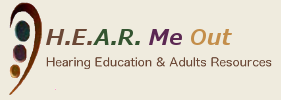Erika’s Story
I am a friend to a wonderful, funny guy. If I ran down the list of words to describe him you would be reading for years. So here are a few prominent words that come to mind; charming, handsome, determined, driven , focused and oh; hard of hearing. This is my story of who we are, never limited by the conditions and labels. We embrace, embark and encourage the words we want to have others know us by.
What I learned:
I have learned many things about some of the impacts the deaf and hard of hearing may experience in social interactions. When I met my friend, to my surprise I discovered he was completely deaf in one ear and had nearly 80% hearing loss in the other. His ability to communicate primarily consisted of lip reading. I was completely blown away. I knew he had trouble hearing well over the phone but no idea of the extent of the loss.
Being with my friend has taught me so much about the need for clear communication. We have worked together to determine the needs he has and how I could and still can make sure we are doing our best to communicate effectively. Often times I have learned that people assume that hearing loss of his magnitude means he does sign language or that they must yell so he can feel included. This has had led to some of the most difficult experiences we have had to face, even from those who mean well. We have also had our own challenges with being comfortable enough to let others know that he is unable to hear them out of fear of their responses.
The worst we have heard :
“You don’t look deaf.” Wow, how does someone who is deaf look?
“Well you speak so well ! I am surprised by how smart you are.” Really and that was meant as a compliment because hearing somehow diminishes intelligence??
“You know it is you’re responsibility to make sure you can hear me, it’s frustrating having to face you!” Yes that was seriously stated to him before.
What we have done:
Hopefully by writing this I can help someone else understand some ways to help their mate, family , friends and even co-workers better communicate with those with hearing loss.
First, talk to your mate. What I learned was the best way to communicate with someone like him (someone who relies primarily on lip reading) is that I always face him while speaking. Even if there are others around I make sure he is included in our conversations and I informed them that I will be facing him. I often ask they do the same when speaking so he is never left out. Also, talk with your own friends and family so they know how to communicate without appearing disrespectful.
Be honest with each other. We had to speak openly and honestly about expectations and areas that we could improve to help our own communications. We also talked about what helps him when he is around friends and family or even other associates. This meant that we had to get over the fear of discrimination and bias and let people know he had hearing loss .
Be sure to offer support . Any relationship that wants to thrive must have a great support system. The support must comes from not only you, but even those that you consider friends or family as well. Your partner must know that you can be counted on or trusted to help them overcome any challenges they encounter due to hearing loss.

My sister tuhgat her son sign language VERY early, before six months I believe. All she did was make the sign while saying the word. For example, she yould ask him, “Do you want some milk?” (saying the word milk slightly louder) and make the sign for milk before giving him any. He learned very quickly that if he wanted milk all he had to do was make the sign, and was able to be very clear about what he wanted. She did that with a few other signs (done, more, and dirty come to mind first, although there were several others.) By the time he was about one, he had replaced most of the signs with baby words, but still used his signs once in a while.For a deaf child, it would probably be the same process, simply without the need of speaking. If you make the sign for milk immediately before breast feeding many times in a row, the baby will quickly learn that the sign means “milk” or “food.”References :